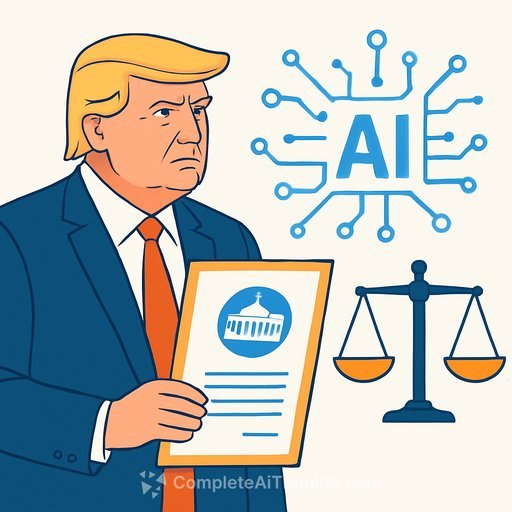Will AI Replace Legal Jobs in Uganda? What to Do in 2025
Short answer: no. AI will not replace Ugandan lawyers overnight. It will replace parts of your workflow. Document review can be up to 70% faster. Drafting can be up to 10x quicker. But risks are real: citation errors still exceed 17% in tests, 13% of Ugandans don't know their data rights, and 80% of agencies think the DPPA doesn't apply to them.
Act now: register with the PDPO (UGX 100,000; 4-7 days), upskill your team, verify every AI output, and put governance in place by year-end.
Table of Contents
- How AI is Reshaping Legal Work - The Uganda Context
- Where AI Already Adds Value for Ugandan Lawyers
- Limits, Harms and Real Risks in Uganda
- Data Protection & Regulation - Uganda and Cross-Border Rules
- Ethics, Courts and Professional Responsibility in Uganda
- Labour Market Effects & New Roles for Uganda's Legal Workforce
- Practical 2025 Action Plan for Ugandan Firms and Lawyers
- Vendor Due Diligence and Procurement Checklist for Uganda
- Pilots, Metrics and Governance - Measuring AI Impact in Uganda
- Quality Control, Malpractice Prevention and Insurance in Uganda
- Monitoring Regulation and Staying Compliant in Uganda
- Conclusion & 2025 Checklist for Ugandan Legal Professionals
- Frequently Asked Questions
How AI is Reshaping Legal Work - The Uganda Context
Across Uganda, legal work is moving from paper-first to data-first. AI accelerates research, contract review, and drafting. Litigation teams use analytics to mine case histories and tighten strategy. The gains are real, if paired with verification and clear policies.
Adoption is uneven. Bandwidth, costs, and skills slow things down. Regional policy is catching up, with Uganda moving toward a human-rights-based AI framework by 2025. Treat tools as leverage, not magic. Procedures still win cases.
Where AI Already Adds Value for Ugandan Lawyers
AI shines on repetitive tasks. It drafts first versions, flags risky clauses, summarizes case law, and extracts facts from large files. That frees time for strategy and client counsel.
Local tools and curated student kits are improving access to precedents and legal research. Commercial platforms report large speed gains-some up to 10x for drafting and review. The key is simple: use tools to produce a solid first pass, then verify and refine.
Limits, Harms and Real Risks in Uganda
Treat AI like a fast but unpredictable junior. Hallucinations are not rare. Benchmarks show legal models can still produce incorrect citations more than 17% of the time. Audits have logged dozens of filings per month with made-up authorities.
Your guardrails:
- Independently verify every AI-sourced citation and quote.
- Train staff and mandate disclosure in internal policy.
- Use a pre-filing verification checklist every time.
One bad "ghost precedent" can waste court time, invite sanctions, and damage client trust.
Data Protection & Regulation - Uganda and Cross-Border Rules
DPPA 2019 and the 2021 Regulations apply now. If you collect or process personal data, register with the PDPO, implement principles (lawfulness, purpose limitation, minimisation, security), appoint a DPO where applicable, and run DPIAs for high-risk use.
Cross-border transfers require adequate protection or consent. Enforcement is active: a 2025 case led to conviction and a UGX 300,000 fine. Non-compliance risks fines, imprisonment, and corporate penalties up to 2% of turnover.
Do this:
- Register/renew with the PDPO annually (UGX 100,000; 4-7 working days).
- Document lawful bases and transfer mechanisms.
- Run DPIAs for AI projects touching personal data.
- Bake breach notice and verification duties into vendor contracts.
Ethics, Courts and Professional Responsibility in Uganda
Capacity constraints and limited ethics infrastructure increase risk. Without clear review practices, AI can amplify errors: confidentiality lapses, weak consent, and unfair process.
Build governance. Use multidisciplinary review for high-stakes matters. Pair AI outputs with independent checks. Train staff on rights-sensitive workflows. If your forum is too busy to vet a decision, fix the process before adding technology.
Labour Market Effects & New Roles for Uganda's Legal Workforce
Entry-level tasks are automating: first-pass review, research, due diligence. The old training ground is shrinking. Firms need new pathways.
Redesign early careers around hybrid skills: e-discovery, contract ops, privacy, cyber, and AI governance. Pair juniors with tools and structured apprenticeships so judgment grows while routine work compresses.
Practical 2025 Action Plan for Ugandan Firms and Lawyers
Keep it simple and sequenced:
- Upskill: enroll teams in practical, accredited digital literacy and legal AI programs.
- Form an AI committee; consider a Chief AI Officer to own policy, pilots, and hiring standards.
- Run short pilots; measure speed, accuracy, client impact.
- Mandate a verification and ethics checklist before any filing or client advice.
- Use analytics selectively for litigation; document how it informs strategy.
Looking for structured learning paths? Explore curated options by role at Complete AI Training.
Vendor Due Diligence and Procurement Checklist for Uganda
Risk-classify each use case. Legal advice, personal data, and litigation analytics are high risk.
- Data and model: What data trained the model? Will your inputs be used to train shared models? How often is it retrained?
- Location and transfers: Where is data stored/processed? Any cross-border flows? What safeguards apply?
- Contracts: Data ownership (inputs/outputs), no-training clause, IP/privacy indemnities, audit rights, SLAs for accuracy, update protocols, clear exit.
- Security and DPIAs: Complete DPIAs, incident notification clauses, encryption, access controls, logs.
- Oversight: Centralize vendor questionnaires and fourth-party tracking. Keep an audit trail.
Bottom line: if it's not written, it won't be enforced. Negotiate hard and document everything before a single document is uploaded.
Pilots, Metrics and Governance - Measuring AI Impact in Uganda
Pilots prove value and teach governance. Set one outcome per pilot. Track a few metrics that matter and review them monthly.
- Efficiency: time saved per drafting/review task; throughput per lawyer.
- Effectiveness: model accuracy; citation/error incidents; false positives/negatives.
- Client impact: satisfaction/NPS; time-to-resolution; cost savings.
- Governance: DPIAs completed; vendor audits; verification/override rates; transfer records.
Kill, scale, or iterate based on evidence. Align your logs and contracts with Uganda's emerging AI rules to stay audit-ready.
Quality Control, Malpractice Prevention and Insurance in Uganda
Make pre-filing verification a habit. Every AI-assisted draft gets a second human review, independent citation checks, and a signed checklist.
- Create a firmwide verification checklist for filings and opinions.
- Document review steps in the matter file.
- Use brokers to align professional indemnity and cyber cover with your controls.
Catch the hallucination at draft stage-not in court.
Monitoring Regulation and Staying Compliant in Uganda
Turn headlines into a checklist. Uganda's regulator expects registration, records, and cross-border safeguards-even for offshore processors handling Ugandan data.
- Confirm if you are a controller or processor and register via the PDPO portal.
- Appoint a DPO and publish a contact channel.
- Run DPIAs on high-risk AI processing.
- Keep transfer justifications and safeguards on file for inspection.
These are low-friction wins that reduce legal and reputational risk fast.
Conclusion & 2025 Checklist for Ugandan Legal Professionals
Treat AI as an audited assistant. Skills and governance keep you in control; speed is the bonus.
- Ethics and legal review: embed sign-off in your workflow.
- Upskill your team: practical, job-ready training beats theory.
- Verification: no AI output goes to a client or court without checks.
- Pilots and metrics: run small tests and scale what works.
- Compliance: register with PDPO, log DPIAs, and control cross-border transfers.
Frequently Asked Questions
Will AI replace legal jobs in Uganda?
No. It will compress routine tasks-review, research, drafting. Firms that reskill juniors, redesign early careers, and run governed pilots will keep lawyers central and clients confident.
What practical benefits can lawyers expect right now?
Up to 70% faster document review, first drafts in minutes, rapid precedent summaries, and analytics that guide strategy. The gains show up when you pair tools with verification and clear policies.
What are the main risks and how do we mitigate them?
Hallucinations, privacy exposure, and vendor misuse. Mitigate by independently checking citations, mandating training and disclosure, running DPIAs, and locking in contracts with no-training clauses, audit rights, and indemnities. Use a verification checklist before filing and keep the right insurance.
Stanford HAI: LLM hallucinations and accuracy
What are the must-do compliance steps for 2025?
Register with the PDPO (UGX 100,000; 4-7 days), apply DPPA principles, appoint a DPO where needed, run DPIAs on high-risk AI, and control cross-border transfers. Enforcement is active and penalties can reach 2% of turnover.
Your membership also unlocks:






